Search Results for Tag: Portugal
Dancing to keep women safe
Melisa Rodrigues, a 27-year-old from Lisbon, used to work for a big international company. At some point she realized, money wasn’t the key to happiness. So she quit her job, did a Master’s degree in globalization and development and went to India to work for an NGO.
It was in India that she learned about the One Billion Rising movement – an annual dance event demanding an end to violence against women and girls all over the world.
Melisa realized that violence – particularly domestic violence – was a big problem in her home country, Portugal. So she organized a One Billion Rising event in a train station in Lisbon to raise awareness and help women affected by violence know they’re not alone.
Listen to the report by Nádia Dinis in Lisbon:
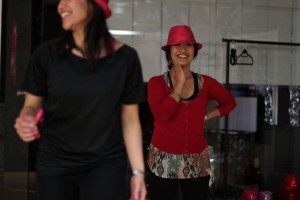
Melisa Rodrigues is practicing her dance moves for the One Billion Rising event (Photo: Miguel Fascinado)
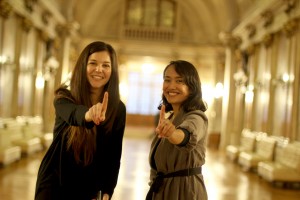
Melisa (right) is pictured with Rita, another volunteer, at the Portuguese parliament just before the One Billion Rising event (Photo: Miguel Fascinado)
Opening doors abroad
Portugal’s young people are going through difficult times. Youth unemployment in the country is at over 40 percent and many of those who do stay in Portugal end up in jobs that offer little career development. What makes things even tougher is that many Portuguese youth are traditionally reluctant to travel overseas to improve their job opportunities, or even just try something new.
Gonçalo Azevedo Silva is an exception. After spending a year abroad doing a GAP Year, he founded the organization GapYear.pt. The group aims to give Portuguese school leavers a perspective, by connecting them with foundations and charities who need people to volunteer overseas.
Listen to the report by André Leslie:
More on the Gap Year website (in Portuguese.)
Woman climbs Mount Everest to end poverty
Maria da Conceição became the first Portuguese woman to climb Mount Everest. She did it to raise money so that more Bangladeshis living in poverty would have the chance to find a job and feed their families.
In her job as flight attendant with Emirates Airlines, Maria da Conceição lived in a world of luxury – first class flights and five stars hotels. But that changed eight years ago during a stopover in Dhaka, where she was faced with a different reality.
In Bangladesh, she witnessed impoverished children living on the street, with little access to food and clothes, let alone education.
“I couldn’t ignore the poverty that I saw with my own eyes. It was impossible for me to go back to my daily routine as a flight attendant and ignore what I saw there,” she told DW.
As a result, Maria da Conceição launched the Dhaka Project, helping almost 600 children, by giving them access to education, health care, food, clothes and community aid.
For the former flight attendant, it was “unbelievable” that these children “didn’t have any kind of rights.” Maria said that they were “forgotten” and “ignored” in Dhaka’s streets. “It took a foreigner to come and help them. Now they have some rights,” she said.
The Dhaka Project was a non-profit organization, so Maria had to fight for donations. The majority of funding came from Dubai, in the United Arab Emirates, while there has also been some help from Portugal, Maria’s home country.
The Dhaka Project recognized with the European Union Women Innovators Prize and the Emirates Woman of The Year Award.
Resistance and crisis
Maria criticizes the government of Bangladesh for hindering her work. “I am not welcome in their country. They didn’t give me a visa,” said Maria. And, last year, they even accused her of human trafficking.
“Those were rough times. I fought against that accusation and I said that it wasn’t true and instead of accusing me they should accuse their own country. That put an end to it,” she remembered.
The global economic crisis has also affected the work of The Dhaka Project. Since money was tight, Maria da Conceição decided to restructure the project. Now, it’s known as the Maria Cristina Foundation, named after Maria da Conceição’s foster mother.
“Now, the main focus is on parents. But, whenever a child up to 18 years of age has the opportunity to gain a scholarship, we provide support for the process,” she said.
She also says that she made an agreement with the British Council that enables parents to learn English. That, in turn, makes it possible for them to work in Dubai. Maria helps out with her connections to her last employer, Emirates Airlines. She left that job when a British family decided to take on the costs of the foundation for a two-year period.
“When these people arrive in Dubai they don’t have anything. We help them to buy everything that they need. We take them to the hairdresser, to the dentist and we give them pocket money for food,” she said. “When they start working, the first month goes unpaid, so the foundation helps them to live comfortably during that period of time. Once they receive their first salary, we do what families do when their children have their first job: You have your own salary, so now you don’t need our help anymore.”
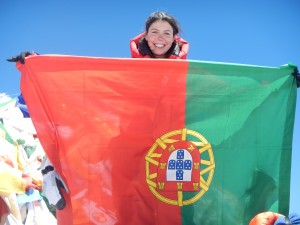
Hardly finished with her first major goal, Maria has already set another (Photo: Maria da Conceição)
Climbing to great heights
Before the global economic crisis, Maria was able to help almost 600 children, but now, because of her tight budget, she can only help one family at a time. Because of that, she was forced to think outside the box. Climbing Mount Everest was a way to get media attention again and raise enough money to continue her work.
She started to prepare for the expedition to Mount Everest a year ago. The training was hard, but she is determined to succeed. “It was a very intense month. I had to go to school in India to learn how to climb a mountain. In Dubai I did conditioning, I did cycling; I had to climb stairs wearing a suit weighing 29 kilograms for at least four hours a day. The training was designed to break me in, physically and mentally,” she said.
And she made it. Maria da Conceição became the first Portuguese woman to climb Mount Everest and now she expects to have the funding she needs to follow up on what she started eight years ago – and help break the chain of poverty in Bangladesh.
But Maria wants to do even more. In November, she will start the 7-7-7 challenge: seven marathons in seven continents in seven days, in order to finance her project. After all, as she told DW, the children and the parents are her family now and her way of life. And after Mount Everest, she’s in great shape.
Go to the Maria Cristina Foundation’s website.
Author: Daniel Pinto Lopes
Editor: Kate Müser
Resuscitating a Portuguese ghost town
Francisco could have gotten a well-paying job in the city. But the the young Portuguese academic decided to use his agricultural expertise to rejuvenate a local town suffering from economic decay.
Listen to the report by Guilherme Correia da Silva in Querença, Portugal:



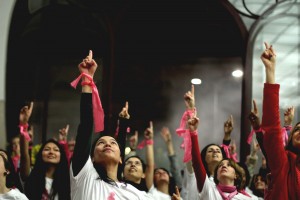
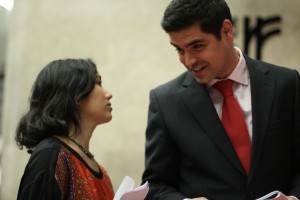

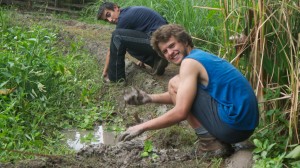
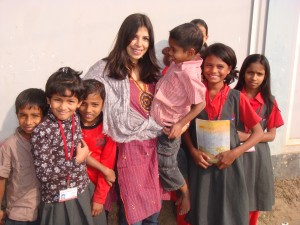
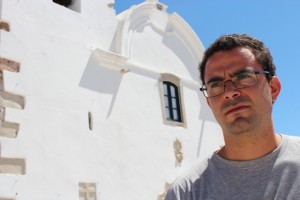
Feedback